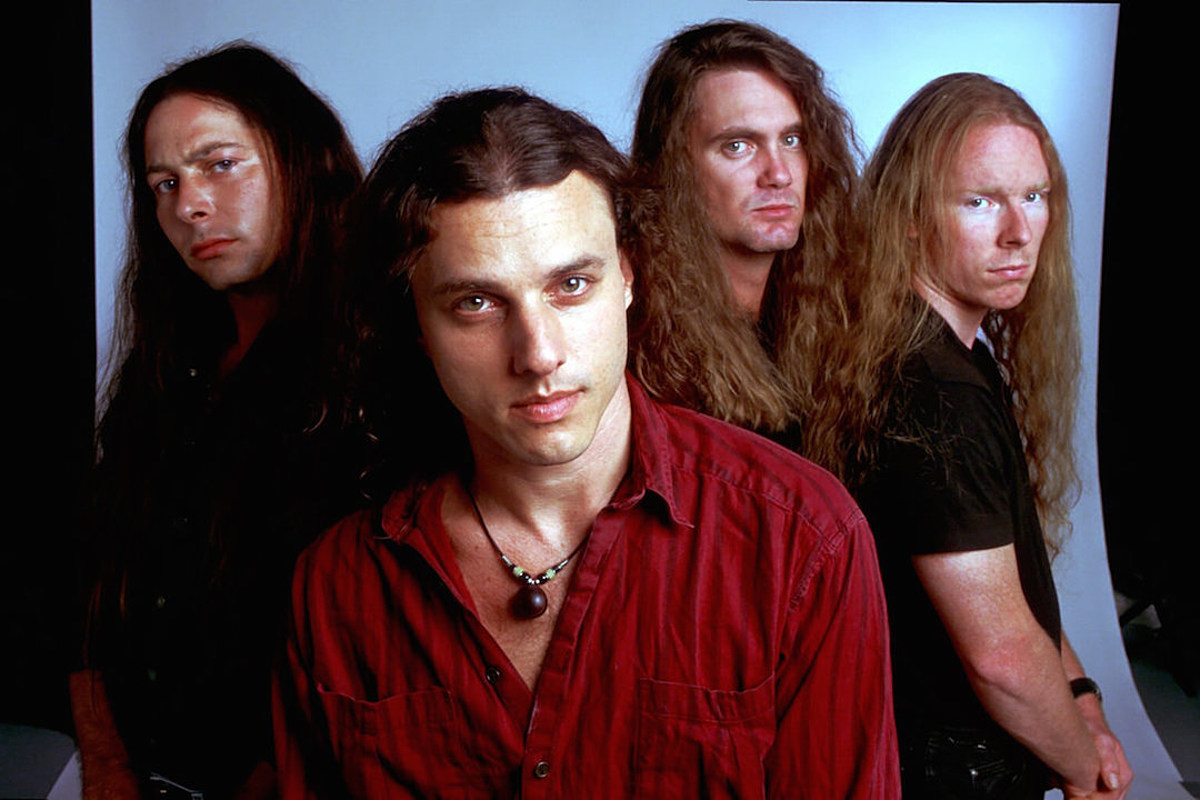One of the greatest tragedies in the history of death metal took place on Dec. 13, 2001, when Death frontman Chuck Schuldiner (pictured front center) died following a prolonged battle with a brain tumor. He was 34.
Even though fans continue to debate whether or not Schuldiner coined the term death metal (extreme thrash band Possessed released a demo called Death Metal in 1984, the same year Death sent out their first demo Death by Metal), that issue was never important to Schuldiner. He never wanted to be the first, he just wanted to be known as a guy who pushed the boundaries of the genre. In an early interview, Schuldiner said he was flattered by people who considered him the founder of the genre, but added, “In my opinion Venom was the first to have that brutal vocal styles, tuned low, that initial brutal aggression. But maybe I’ve kept it going to what death metal is today.”
There’s no question that Schuldiner played a major role in refining and developing the sound of the Florida death metal genre. He formed the band with guitarist Rick Rozz and drummer Kam Lee in 1983 at the age of 16, and released the band’s first album, Scream Bloody Gore, on Combat Records in 1987. That album and the follow-up, 1988’s Leprosy, exemplified the sound of the underground genre and almost immediately, countless bands latched onto the band’s savage template, which combined churning down tuned guitars, hammering beats and growled vocals that were less decipherable than those of even their mentor’s Venom.
Throughout the band’s career, Schuldiner worked with a revolving door lineup of musicians to evolve the sound of the band, With 1990’s Spiritual Healing, Death started to transform into a progressive, technical death metal band, adding abrupt 90-degree rhythm shifts and multiple tempo changes without sacrificing their heavy groove. Schuldiner worked on the album with guitarist James Murphy, bassist Terry Butler and drummer Bill Andrews. Just a year later, Schuldiner was working on the groundbreaking Human with jazz-death pioneers from the band Cynic, guitarist Paul Masvidal and drummer Sean Reinert, adding even more twists and turns to Death’s sound and expanding the parameters of what death metal could be.
“We supposedly wimped out back in 1990 with Spiritual Healing because there were so many traditional metal elements in the music,” Schuldiner told Guitar World. “I’m glad to see that a lot of these metal bands today are incorporating more traditional elements into their music because that’s where it all comes from. I never lost touch with that through the years, but I was very much crucified for it a while back. And I guess it’s good to know that I was doing the right thing.”
By the time he was diagnosed with a rare brain tumor, pontine glioma, in 1999, Schuldiner had abandoned death metal and was playing progressive power metal in Control Denied, which formed in 1995, three years before Death’s progressive-death studio metal album The Sound of Perseverance. In 1999, Control Denied released their only album, The Fragile Art of Existence.
Schuldiner underwent surgery for his tumor in 2000 and seemed to be on the mend at first. But a few months after the operation it was apparent that the part of the tumor that couldn’t be removed without killing the musician was rapidly growing and by 2001 the condition was inoperable.
After Schuldiner died, over 1,000 artists that considered him an influence paid tribute to the musician and wrote messages in an online forum. “Chuck’s music was really important to me growing up,” Slipknot vocalist Corey Taylor told MTV. “It was really intricate and interesting.”
A decade after Schuldiner died the legacy of Death continued. A group of musicians who were in the band and other artists – guitarists Masvidal, Shannon Hamm, Bobby Koelble; bassists Steve Di Giorgio and Scott Clendenin; and drummers Masvidal, Gene Hoglan and Reinert – joined forces to pay tribute to Schuldiner on the “Death to All” charity tour. Vocalists and guitarists Charles Elliott (Abysmal Dawn) and Matt Harvey (Exhumed) were recruited for the dates. The group played five shows in 2012 and went out again in 2013, with Max Phelps handling vocals. The band has since changed its name to DTA and plan to book more shows in the future.
“It’s a really cool tribute to our fallen metal brother, Chuck,” says Hoglan (Testament, Galaktikon, Dark Angel). “Obviously it’s a sad thing that Chuck has passed, but this way we get to keep the music alive and it’s really fun. You see grown men crying in the front row. Every night you see grounds of people tearing up. It’s really like a rebirth for the band in a way; Death played their final shows in 1998. A lot of the older guys that used to come are like, ‘I haven’t seen the band in 20 years and this is awesome!’ And there are also new people who were too young to catch Death when they were around but were influenced by the band and now get to see songs from the guys who originally played it. So it’s a great thing for everyone.”
Loudwire contributor Jon Wiederhorn is the author of Raising Hell: Backstage Tales From the Lives of Metal Legends, co-author of Louder Than Hell: The Definitive Oral History of Metal, as well as the co-author of Scott Ian’s autobiography, I’m the Man: The Story of That Guy From Anthrax, and Al Jourgensen’s autobiography, Ministry: The Lost Gospels According to Al Jourgensen and the Agnostic Front book My Riot! Grit, Guts and Glory.
10 Greatest Death Riffs
Death Albums Ranked
